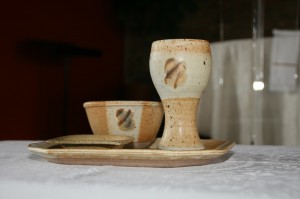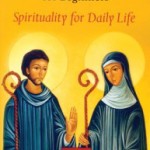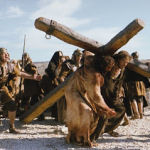 This year during holy week we put “The Duty of Constant Communion” into practice. In this sermon from Feb. 19, 1732, in addition to refusing objections regarding frequently partaking of the Lord’s Table, John Wesley offers the following positive reasons for partaking from the bread and cup often:
This year during holy week we put “The Duty of Constant Communion” into practice. In this sermon from Feb. 19, 1732, in addition to refusing objections regarding frequently partaking of the Lord’s Table, John Wesley offers the following positive reasons for partaking from the bread and cup often:
- It is the command of God that we partake often, and what other commands do we limit how frequently we obey?
- It is offered as a means of grace, so why would we not want to receive God’s grace as often as we might?
Our church received the Lord’s Table during Palm Sunday worship, and then offered drop in times for communion from 6 a.m. to 1 p.m. Monday through Thursday. On Friday we partook together at our evening Good Friday service, and again during Easter Sunday worship. While maintaining the ritual element of the Lord’s Table service, for those that attended every day they discovered a different focus each time. This was the schedule:
- Palm Sunday (Luke 22:17-20) As the people proclaimed Jesus king on this day, we looked forward to celebrating this meal with Jesus in person in the Kingdom.
- Monday (1 Corinthians 11:23-26) We recalled that Jesus commands us to remember his death this way often until he returns.
- Tuesday (John 6:26-27, 35, 47-51) As many people followed Jesus in the hope that he would miraculously produce more food for them to eat, we remembered that his flesh is true food and his blood true drink. Participants were given a substantial piece of flat bread to eat and a full cup of juice, and we used a communion set with the symbol of Tabgha where we commemorate the feeding of the 5,000.
- Wednesday (John 11:21-27) Through the body and blood of Jesus we have resurrection and life, new life to come and new life right now. Interestingly, when I read the question of Jesus to Mary, “Do you believe this?” often before I could read Mary’s answer, the answer came from the mouth and heart of the person preparing to receive the Lord’s Table. “Yes, I believe.”
- Thursday (1 Corinthians 11:27-31 & Hebrews 4:13-16) This was our day of confession. After reading the first Scripture passage, people were given time to confess their sins to God in prayer. After reading the second passage, people boldly came forward to receive grace at the Table. Had we not been in a particular teaching series, this might have been a good theme for Good Friday as well.
- Good Friday (1 Corinthians 1:21-24 & John 6:53-58) We looked at the curious contradictions of the cross: wisdom and foolishness, a sign and a barricade, love and suffering, death and life, grief and hope, and a Savior saying in order to have life one must eat his flesh and drink his blood.
- Saturday (no service) Although we did not offer a service this day, an emphasis on Christ’s descent into Hades would be appropriate.
- Easter Sunday (1 Corinthians 10:16-17 & Romans 6:5) We are untied with Christ and each other in death and life through His body and the covenant made by His blood. We all ate from one loaf this day.
photo credit: Paul Tillman. Pottery by Mary Dosch of Brickyard Pottery and Glassworks, Shell Lake, WI.






